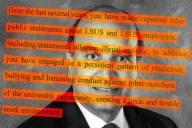You have /5 articles left.
Sign up for a free account or log in.
A few weeks ago, sitting over a cup of coffee, a writer in his twenties told me what it had been like to attend a fairly sedate university (I think he used the word "dull") that had a few old-time New Left activists on its faculty.
"If they thought you were interested in anything besides just your career," he said, "if you cared about ideas or issues, they got really excited. They sort of jumped on you."
Now, I expected this to be the prelude to a little tribute to his professors – how they had taken him seriously, opened his mind to an earlier generation’s experience, etc. But no.
"It was like they wanted to finish their youth through you, somehow," he said. "They needed your energy. They needed you to admire them. They were hungry for it. It felt like I had wandered into a crypt full of vampires. After a while, I just wanted to flee."
It was disconcerting to hear. My friend is not a conservative. And in any case, this was not the usual boilerplate about tenured radicals seeking to brainwash their students. He was not complaining about their ideas and outlook. This vivid appraisal of his teachers was not so much ideological as visceral. It tapped into an undercurrent of generational conflict that the endless "culture wars" seldom acknowledge.
You could sum it up neatly by saying that his professors, mostly in their fifties and sixties by now, had been part of the "Baby Boom," while he belonged to "Generation X."
Of course, there was a whole segment of the population that fell between those two big cultural bins -- people born at the end of the 1950s and the start of the 1960s. Our cohort never had a name, which is probably just as well. (For one thing, we’ve never really believed that we are a "we." And beside, the whole idea of a prepackaged identity based on what year you were born seems kind of tacky.)
One effect of living in this no-man’s-land between Boomers and Xers is a tendency to feel both fascinated and repulsed by moments when people really did have a strong sense of belonging to a generation. The ambivalence is confusing. But after a while it seems preferable to nostalgia -- because nostalgia is always rather simple-minded, if not dishonest.
The recent documentary The Weather Underground (a big hit with the young-activist/antiglobalization crowd) expressed doe-eyed sadness that the terrible Amerikan War Machine had forced young idealists to plant bombs. But it somehow never mentioned that group’s enthusiasm for the Charles Manson "family." (Instead of the two-fingered hippie peace sign, Weather members flashed a three-finger salute, in honor of the fork used to carve the word "war" into one of the victims’ stomach.) Robert McNamara and Henry Kissinger have a lot of things to answer for – but that particular bit of insanity is not one of them.
Paul Berman, who was a member of Students for a Democratic Society at Columbia University during the strike of 1968, has been writing about the legacy of the 1960s for a long time. Sometimes he does so in interesting ways, as in parts of his book A Tale of Two Utopias; and sometimes he draws lessons from history that make an otherwise placid soul pull out his hair with irritation. He has tried to sort the positive aspects of the 1960s out from the negative -- claiming all the good for a revitalized liberalism, while treating the rest as symptoms of a lingering totalitarian mindset and/or psychological immaturity.
Whatever the merits of that analysis, it runs into trouble the minute Berman writes about world history -- which he always paints in broad strokes, using bright and simple colors. In his latest book, Terror and Liberalism, he summed up the last 300 years in terms that suggested Europe and the United States had grabbed their colonies in a fit of progress-minded enthusiasm. (Economic exploitation, by Berman’s account, had nothing to do with it, or not much.) Liberalism and Terror is a small book, and easy to throw.
His essay in the new issue of Bookforum is, to my mind, part of the thoughtful, reflective, valuable side of Berman’s work. In other words, I did not lose much hair reading it.
The essay has none of that quality my friend mentioned over coffee – the morbid hunger to feast off the fresh blood of a younger generation’s idealism. Berman has fond recollections of the Columbia strike. But that is not the same as being fond of the mentality that it fostered. "Nothing is more bovine than a student movement," he writes, "with the uneducated leading the anti-educated and mooing all the way."
The foil for Berman’s reflections is the sociologist Daniel Bell, who left Columbia in the wake of the strike. At the time, Bell’s book The End of Ideology was the bete noir of young radicals. (It was the kind of book that made people so furious that they refused to read it – always the sign of the true-believer mentality in full effect.) But it was Bell’s writing on the history of the left in the United States that had the deepest effect on Berman’s own thinking.
Bell noticed, as Berman puts it, "a strange and repeated tendency on the part of the American Left to lose the thread of continuity from one generation to the next, such that each new generation feels impelled to reinvent the entire political tradition."
There is certainly something to this. It applies to Berman himself. After all, Terror and Liberalism is pretty much a jerry-rigged version of the Whig interpretation of history, updated for duty in the War on Terror. And the memoiristic passages in his Bookforum essay are, in part, a record of his own effort to find "the thread of continuity from one generation to the next."
But something else may be implicit in Bell’s insight about the "strange and repeated tendency" to lose that thread. It is a puzzle for which I have no solution readily at hand. Namely: Why is this tendency limited to the left?
Why is it that young conservatives tend to know who Russell Kirk was, and what Hayek thought, and how Barry Goldwater’s defeat in 1964 prepared the way for Reagan’s victory in 1980? Karl Marx once wrote that "the tradition of all the dead generations weighs like a nightmare on the brain of the living." So how come the conservatives are so well-rested and energetic, while the left has all the bad dreams?








